- Home
- Clare London
Romancing the Ugly Duckling Page 2
Romancing the Ugly Duckling Read online
Page 2
“He never liked having his photo taken,” Geoff said, his gaze on the image.
“Not bloody surprised.” That was Gerry again. “Look at the state of him! A grubby, lopsided, goblin-faced lump. I always said he was some kind of throwback. Nothing like the rest of us. No wonder we called him the Ventura Ugly Duckling.”
“You mean you did,” Geoff said quietly.
“No one ever contradicted me,” Gerry said smugly, as if this was a familiar argument.
Geoff and the twins all flushed.
Perry took another look at the photo. He’d rarely seen a man’s looks he couldn’t improve with careful dressing and a good hairstylist, but he was struggling to decide where to start with Greg Ventura.
“Peregrine?” Eddy was giving Perry what he called a pointed look. “What’s your plan of action?”
My—what the hell? Perry drew a deep breath. “Where is Greg now?”
“The Western Isles,” Geoff said.
Perry had no idea where that was. He’d never been anywhere but London in his whole life.
Geoff continued, “We’ll pay for everything, of course.”
Perry could imagine Eddy’s eyes lighting up with pound signs. The deal was already done, he could see, insurmountable challenge or not. “Okay. Well, if you’d like to bring him in to the agency, I can assess what needs to be done.”
Gerry laughed. “Oh, he won’t come here.”
“I’m sorry?”
Geoff bit back what looked like a long-suffering sigh. “I’ve rung him several times, but his phone never seems to be charged up.”
“Or he’s ignoring you,” George muttered, then winked at Gareth.
“I sent him a letter in the end,” Geoff said carefully, as if he was afraid of angrier words spilling out against his will, “explaining it all, and that it was time he came back to London. His reply was… well, brusque in the extreme.”
“One creased postcard,” Gareth said, with some glee. “Didn’t even put enough postage on it. Geoff had to pay the excess on delivery.”
“It said—” George added.
“I’m here to stay!” the twins chorused together.
Geoff sighed and stood, straightening his cuffs as if preparing to leave. “It appears he won’t leave the Isles. At least, not at the moment. You’ll have to go to him.”
Perry blinked hard, scrambling to his feet in Geoff Ventura’s wake. “Go where?”
Geoff peered at him as if he were mentally challenged. “To Scotland. We’ll make the arrangements. Then you can do your magic with Greg right there, and bring him back in good time for the filming.”
“Remember,” Gerry added darkly. “He has to come willingly. He has to take part in the show with us all. And he has to look as good as us all. He can’t show us up. The media will rip us to shreds if he appears in his ugly duckling mode.”
“Go to Scotland?” Perry’s attention was still fixed on that shocking nugget of news. He swung around to face Eddy, but Eddy wasn’t meeting his gaze. “I can’t do that!”
“Peregrine. It’s only for a week or so. We’ll talk about it later. Not now, please.”
“I mean,” Perry gabbled on, aware that the Venturas were looking at him with varying degrees of sympathy, amusement, and vindictiveness. “I have other clients. I have a flat, a social life. Weekly lunch with my mother.”
Eddy turned to the Venturas and gestured to the door with his plump hand, albeit the space only allowed for single-file exit from the room. “It’ll be fine,” he said pointedly.
Perry stood, watching them all walk across the office floor on their way out, where all he could hear was the floating thread of Eddy’s voice, declaring gaily, “We’ll be in touch!”
Chapter Two
GREG Ventura knew things weren’t going his way when he sank into mud so deep it seeped in over the top of his Wellington boots.
Fuck.
Greg lifted his feet out of the ditch, one after the other. The squelch inside the boots was revolting. Trust him to find a patch of peat bog that hadn’t dried out since the last rain. With a sigh, he used his stick to scope out firmer ground and adjusted his route down the hillside back to his croft. The evening was moving in fast, as it did on the small Scottish island of North Uist, and he wanted to get back home before nightfall. Not that he wasn’t prepared to walk the hills at night, but it wasn’t his preferred option. By now, he knew the terrain as well as any local around here, but it was never a sensible option to scramble in the dark.
A wet nose nudged at his hand, and he instinctively reached for his dog’s head. “Yes, Rory,” he murmured. “We’re going back now. Warm blankets, food, and a beer, right? Well, maybe not the beer for you. Last time you insisted on a taste, you threw up on my bedroom rug.”
The dog snuffled. Rory, a wise and trusty Border collie, obviously didn’t see any need for a verbal reply when humans usually answered their own questions. Instead, he crouched down as if at the starting line, then raced away ahead of his master toward home.
Greg strode after him, grinning. As he reached the border of the croft, the ground was more secure, the peaty marshland now far behind him. The weather had been bright and dry for several days, but Greg could tell by now when storms were on their way. Moisture hung in the air like a thin, ragged blanket, dampening his hair and catching in his throat when he called to Rory. It had been a very wet winter on the Scottish Isles, and despite the first signs of spring appearing with the heather and the return of birds wheeling and foraging over the bog, the sky on the horizon was still tinged gray and bleak with clouds.
And Greg loved it.
To him, the change of weather was part of the wild, browbeaten beauty of this place. For as far as he could see, the scenery rolled away, flat and often dark, broken not by trees but by low scrub. He knew that after a few hundred yards either way he’d find one of the many small inland lochs, the clear water glittering in any weather, fish darting and twisting under the surface. Off the northwest coast of Scotland, North Uist was the country’s tenth largest island. That didn’t give a real sense of it, though, because it was still only three hundred-odd square kilometers in size, with only a thousand inhabitants, excluding the birds, of course, which numbered far more thousands. It was a bird watcher’s paradise, or so Greg had been told by the natives. He wasn’t personally interested in watching wildlife, not even the basking sharks and seals that were seen off the coast.
He craved the solitude.
On the outskirts of Lochmaddy, the largest town on the island, Greg’s rented croft was in a set of three. Each had a small cottage at the end of a long stretch of land. His place only measured six acres, yet they were all far enough apart that when he reached home, he could believe he was the only inhabitant for miles. To the left was Alasdair Campbell, a middle-aged sheep farmer who was happy to coexist with his neighbor with the minimum of conversation, but a grudging but friendly nod of the head when they met. On the other side was the Mackie family, fierce old Cameron and his wife, Aileen. The adults all lived alone at present. The children of North Uist often left for the bright lights or a career on mainland Scotland, but they just as often came back, either to settle or for temporary respite.
Greg understood the situation perfectly. He’d been living in and around Scotland for almost five years, and two years ago had landed up in North Uist. He hadn’t wanted to move again since: it had been the best decision he’d ever made in his life. Maybe it had started out for him as a refuge as well—though he wasn’t going to dwell on those early days now—but it had grown into his home. He might not have been drawn by the lure of family: in fact, it was the complete opposite. But he loved the wild, bleak beauty of the landscape and the forced simplicity of lifestyle. Each day was about basic essentials, reliance on the community, and blessed, hassle-free peace. He had enough money to live on, a part-time job, and the time to paint. He didn’t need any more in his life, did he?
Reaching his back door several minutes after Rory, he let the
m both in. He stamped his feet on the mat and slid out of the boots. Mud had seeped into his thick woolen socks, so he rolled them off as well. The cool air inside the cottage tickled his sweaty toes.
A hot bath was what he needed. He’d been restless all day, and the long walk hadn’t eased it. He also needed to paint; he knew that. It had been a hobby of his since he was a boy, and he’d returned to it here on the island. There was one particular view of the shore that he wanted to work on, and his fingers itched to revisit the canvas. He hadn’t found time over the last couple of days, between chopping firewood, doing repairs around the house, and looking after Rory when the dog picked up a thorn in his paw. There was still more work to do in the cottage before he could truly relax, and he and Rory also needed supper.
He pottered around downstairs, peeling off his clothes as he went. He didn’t bother turning on either the small TV or the radio. The croft was rarely silent in itself—tonight the wind whistled through a split in the kitchen window frame that was on his list to fix, and Alasdair’s sheep gave the occasional soft bleat. Greg didn’t have sheep of his own, although it was expected of crofters in this part of the world. But he’d made his compromise with the community by renting his land out to Alasdair, who let his flock wander over both crofts.
A quiet beep from the living room interrupted his thoughts. It was his mobile, pleading for a fresh charge. Greg constantly forgot where he’d left it.
Rory gave another snuffle and stared up at him.
“Dammit.” Greg frowned. That reminded him—though he couldn’t have explained to anyone how he and Rory conversed so instinctively—that Greg had agreed to meet his mate Dougie at the pub that evening. He didn’t feel particularly sociable, but there were few enough occasions to get together, and friends were to be treasured. They might even get to play a few hands of cribbage.
“What a wild social life I have, eh?” He laughed and scratched Rory’s ears. “No one would believe it back in London.”
That was odd. He hadn’t thought much about London for a long time. The nostalgia was strangely disturbing. But he wouldn’t waste time on introspection; that wasn’t his way. He flipped on the boiler switch to heat up more water for his bath, scooped up his dirty clothes to go in the machine, and made his way upstairs.
IT wasn’t even really a pub, just a back room at Angus McMillan’s farm, where Angus’s entrepreneurial sons had put in a few beer taps and set up tables and chairs around the hearth. Most of the time they arranged regular deliveries of beer and spirits from the mainland, but on the odd occasion it all ran out—like after every ceilidh night they ever catered for—customers had to make do with the sons’ home brew. Greg had found it an acquired taste. When he mentioned that tactfully to Dougie, Dougie had roared with laughter.
“You’re too good t’ them, man!” he said, his lilting Scottish burr much more pronounced when he drank. “It’s muck, nae fit for sheep dip. But there’s enough alcohol in it not t’ notice after a wee while.”
Tonight, Greg saw Dougie at a table by the window, already halfway down his pint. It probably wasn’t his first either. Greg ambled over to join him.
“Mine’s a pint,” Dougie said, and he grinned at Greg. He never much bothered with proper greetings. He was a short but strong young man, a few years older than Greg, who’d run the local store ever since his parents retired back to Edinburgh. This enterprise consisted of converting his hallway and living room with shelving and cupboards, and opening up to customers needing everything from general groceries to boat repairs, including a postal service back and forth from the mainland. The fact his sister Bridie also sold clothing, books, chocolate, and provided an endless supply of free tea, cake, and island gossip meant they were always busy.
Greg grinned back and fetched him a fresh pint without question. They sat together at the small table in comfortable companionship.
“Bridie says are you coming t’ the ceilidh next Saturday?”
“I doubt it. I’m not exactly built for dancing.” Greg didn’t need to look at his long arms and legs to know how he towered over most of his peers. The ceilidhs were the main source of entertainment for the community. Small though the area was, almost everyone came out to dance, sing, and drink themselves even happier, once a month and on special occasions. The village hall was decorated with streamers that luckily didn’t look their age when the lights were turned down low, the musicians on North Uist put on a show as good as any professional band, and Angus’s sons ordered in extra supplies of everything drinkable.
“Aye. Wayne Sleep you’re not,” said Dougie. He drained the rest of his glass, then belched loudly. “None of us can dance, man. We’re a disgrace t’ our kilts. But it’s always a bloody fine evening.”
“I’ll see. May have work to do around the house.” Greg wanted to change the subject. He’d never attended any of the ceilidhs since he arrived, but no one was ever interested or bold enough to challenge him on his antisocial behavior, apart from Dougie.
“You thinking of a good new excuse right now?” Dougie raised his eyebrows.
“What do you mean?”
“I know you cannae face the ceilidhs. But why not? It’s just a dance and a few drams.”
Greg didn’t know what to say. Well, he did, but he couldn’t lay all his burdens on Dougie’s shoulders.
“All the time you’ve been here—you won’t be seen at a social, and you won’t be drawn out,” Dougie continued, though in a quieter tone. His expression was sympathetic. “You have nae contact with the mainland either.”
“I don’t need it,” Greg said. “Just… drop it.”
Dougie nodded slowly, though his expression was still quizzical. “Bridie would take you in a turn around the floor, y’know. If you’re scared of a wee bit o’ dancing.”
Greg smiled and took another sip of beer, refusing to be baited. Bridie was in her twenties and still single, a pretty and friendly girl but with probably far too few choices on Uist. “She needs someone more handsome than me. She shouldn’t have to settle for an ugly duckling.”
Dougie’s eyes narrowed. “Now why the hell d’you say that?”
Greg’s heart started beating faster, and he made an effort to keep his voice steady. “It’s just a phrase.”
Dougie made a snorting noise. “A stupid scunner, you are. She thinks you’re bonny, and she’d tell you you’re talking baws.”
Greg chuckled at the Scottish slang. It enchanted him, even after years of hearing it. “I most certainly am not talking balls. I’m flattered, believe me, but I’m not right for Bridie.”
“That’s damn right,” Dougie muttered into his beer.
“What?”
“Ach, it’s nae to do with your looks,” Dougie said quickly. “I mean, it’s because you’re a fan o’ the rainbow tartan.” And he burst into raucous laughter at his own joke.
Greg blinked hard. He’d never openly discussed his sexuality with anyone on the island. The attitude in Scotland’s cities toward gay people was largely welcoming and even proud, but the isles were a much smaller and tighter community. He knew there were still B&Bs that wouldn’t rent to a gay couple, and parts of the church that wouldn’t perform ceremonies. It hadn’t been a problem so far, in that he’d kept a low profile with the croft’s landlord, Mary McMullen, and he definitely didn’t have any plans for marriage. That said, he didn’t like bigotry, but he’d come to understand that this was a small world of its own, and things moved more slowly. Besides all that, he wasn’t going to expose his private life to anyone indiscriminately.
But it seemed he’d been outed without even knowing.
“Yes,” he said slowly. “That’s why. You’re right. Is that a problem for anyone?”
Dougie grinned. “As long as ye keep it in your own breeks, no skin off my nose.”
At the table a few feet away, a couple of middle-aged men shifted on their seats—had they heard? Were they worried Greg would start talking about gay sex in Technicolor detail?—but
then settled to arguing loudly about the football instead.
Dougie clapped his hand on Greg’s shoulder. His eyes twinkled. “Bridie’d still have you, man, if you could see your way t’ swinging either way.”
At that point, Greg laughed too and surrendered to Dougie’s insistence that it was Greg’s round again. Up at the bar, while he was waiting patiently for service, Dougie appeared at his side. He stood there silently at first, and although Greg knew he didn’t need Dougie’s help with a couple of glasses of beer, he waited just as quietly. He’d done a lot of that over the years. He’d learned when Dougie had something more to say and was preparing it first in his mind.
“Got another message from your brother,” Dougie finally said. “Came in today’s post.”
Greg nodded slowly. Another one.
Dougie made one of his many, expressive snorting noises. “So, you going t’ ask?”
“About the message?” Greg sighed. “Why? It’ll be the same as the last one.”
“Aye.” Dougie nodded. “’Twas.”
Greg raised his eyebrows. Not that he wouldn’t share the contents with Dougie after reading it, but the shopkeepers mysteriously seemed to know the contents of everyone’s post regardless.
Dougie snorted again. “I’m nae opening your mail, man. It was just a card.”
Not even a letter this time, just a postcard. Though considering how he’d replied to the last message, Greg would have expected anything further to be terse. But it was another example of how the lure of family—or lack of, in his case—refused to lie low. “It’s simple, Dougie. He wants me back in London, and I have no intention of going.”
“Why’s he so interested now?”
“I don’t know. Something about a TV appearance by the family. They need all of us there or it can’t go ahead.”
“Jesus God, man.” Dougie looked as disgusted as if Greg had suggested they sacrifice a baby to demons. “Why on earth would they do that?”
Greg grimaced. “Money, I expect.” His family had always worshiped that particular god.

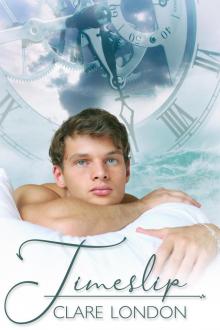 Timeslip
Timeslip Just Like in the Movies
Just Like in the Movies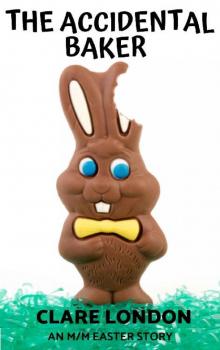 The Accidental Baker
The Accidental Baker Santa, Actually
Santa, Actually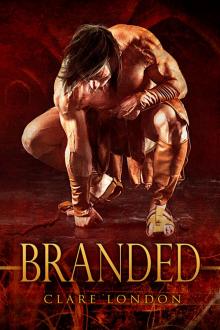 Branded
Branded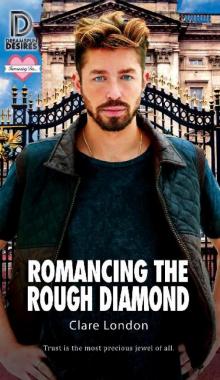 Romancing the Rough Diamond
Romancing the Rough Diamond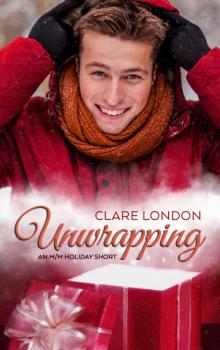 Unwrapping
Unwrapping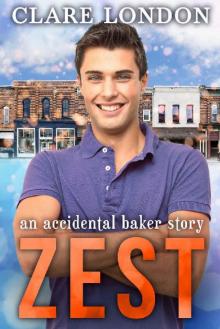 Zest: an accidental baker story (The Accidental Baker Book 2)
Zest: an accidental baker story (The Accidental Baker Book 2) Romancing the Undercover Millionaire
Romancing the Undercover Millionaire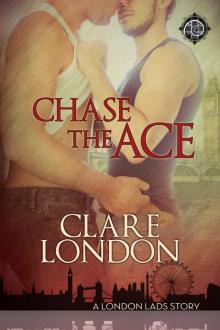 Chase the Ace
Chase the Ace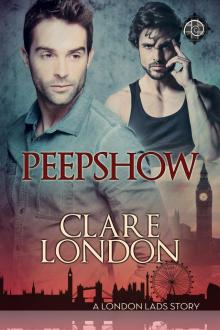 Peepshow
Peepshow Between a Rock and a Hard Place
Between a Rock and a Hard Place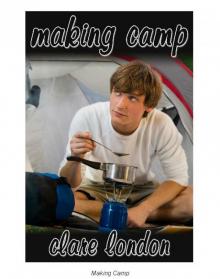 Making Camp
Making Camp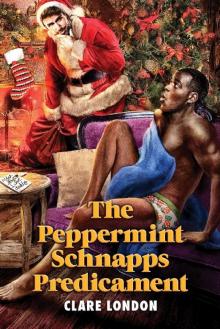 The Peppermint Schnapps Predicament
The Peppermint Schnapps Predicament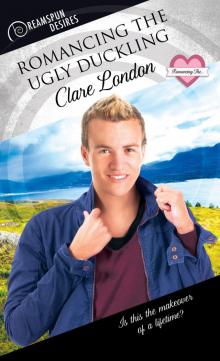 Romancing the Ugly Duckling
Romancing the Ugly Duckling His Gift
His Gift True Colors
True Colors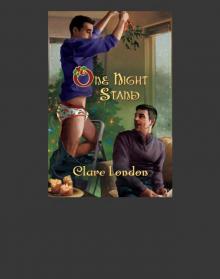 One Night Stand
One Night Stand Romancing the Wrong Twin
Romancing the Wrong Twin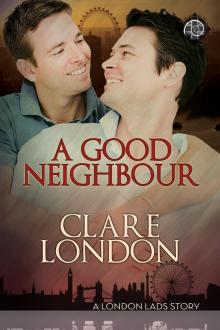 A Good Neighbour
A Good Neighbour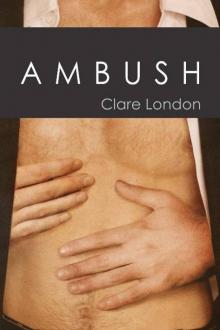 Ambush
Ambush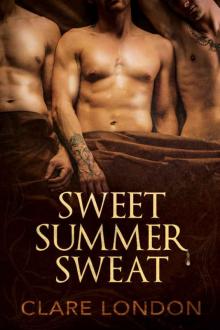 Sweet Summer Sweat
Sweet Summer Sweat